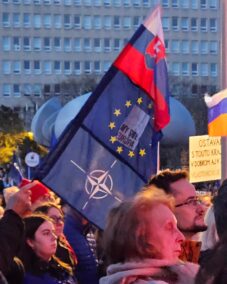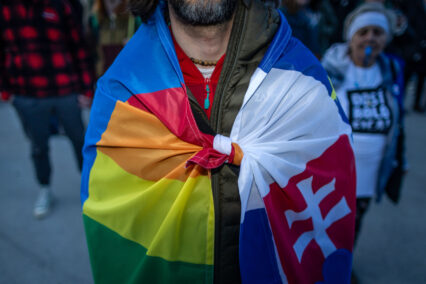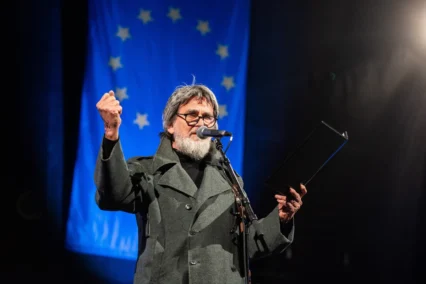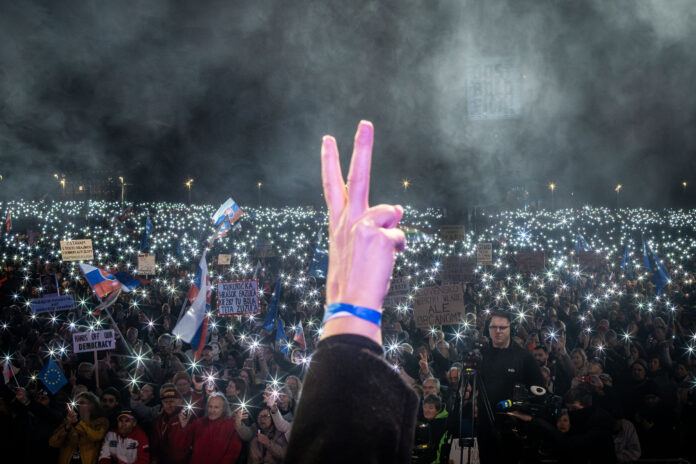In more than 40 towns and cities across Slovakia and abroad, tens of thousands have joined a growing wave of anti-government protests, accusing Prime Minister Robert Fico of dragging the country toward authoritarianism, empowering disinformation, and isolating Slovakia from its European allies. The movement began in December, after Fico met Russian President Vladimir Putin — wanted by the International Criminal Court for war crimes in Ukraine — and has since evolved into the largest civic mobilisation in recent Slovak history. Protesters warn that Fico’s government is systematically dismantling democratic safeguards: a proposed “Russian-style” NGO law could allow the Interior Ministry to dissolve independent organisations without judicial oversight; senior officials spread conspiracy theories comparing vaccinated citizens to genetically modified corn; and LGBTQI+ protections have been gutted, following the suicide of a bullied 12-year-old boy and the government’s withdrawal of vital support funds.
Cultural institutions like the Slovak National Gallery are being hollowed out by politicised leadership, and critics decry the appointment of unqualified party loyalists to public office. Meanwhile, cost-of-living pressures mount, and the Roma community continues to suffer fatal neglect, as illustrated by a deadly fire in Veľký Šariš. From the stage, protest speakers condemned what they call Fico’s dual allegiance to nationalist extremism and Putin’s regime, with one pastor describing Slovakia as part of a continental resistance to “new dictators.” As the Organisation for Security and Co-operation in Europe (OSCE) monitors events on the ground, organisers say they will continue demonstrating until the government reverses its course — warning that this is no longer only about policy, but about defending human dignity, civil liberties, and Slovakia’s place in the democratic world.
In the capital, an estimated 10,000 to 11,000 people gathered in Bratislava’s main square, replicating turnout levels seen in previous weeks. The demonstration, organised by the civic group Peace for Ukraine, featured speeches, cultural performances, and appearances by prominent artists, scientists, clergy, and activists. Protests were also observed by an expert delegation from the OSCE, the international watchdog organisation responsible for upholding democratic norms across Europe.
The spark that ignited the initial protests was Prime Minister Robert Fico’s visit to Russian President Vladimir Putin in December, a move widely condemned by civil society as an act of legitimising a regime facing an international arrest warrant over war crimes in Ukraine. Since then, public outrage has only intensified, fuelled by a series of government actions viewed as assaults on democratic principles, civil liberties, and social cohesion.

From Putin’s Welcome to Public Outrage
In recent weeks, the government has introduced a controversial amendment to the NGO law—widely dubbed the “Russian law”—which would allow the Interior Ministry to dissolve civic organisations without judicial review. “This is no longer just about Fico’s photos with Putin,” warned Filip Vagač from the Platform for Democracy, “but about legal acts that fundamentally restrict civil liberties.” He read from a joint statement by civic organisations warning that such legislation would mark a definitive turn away from the EU and toward authoritarian models. The law would also compel NGOs to report detailed data not only about their statutory representatives, but about all members, raising fears of targeted surveillance and reprisal.
This tightening of control over civil society comes amid growing accusations of disinformation and conspiracy-mongering from within the government itself. Peter Kotlár, the Prime Minister’s appointee for investigating the COVID-19 pandemic response, recently compared vaccinated individuals to genetically modified corn—a claim he based on a discredited figure from the anti-vaccine movement. Biochemist Peter Holub, addressing the crowd, rebuked Kotlár’s pseudoscientific rhetoric. “Vaccines do not alter your DNA. They do not turn you into corn,” he declared. He further warned that such conspiracies fuel the resurgence of deadly but preventable diseases, citing the current measles outbreak in the United States as a consequence of similar anti-vaccine narratives endorsed by figures like Robert F. Kennedy Jr.
The protests also provided a platform for public mourning and fury over the death of a 12-year-old boy, reportedly driven to suicide by homophobic bullying. Film producer Wanda Adamík Hrycová addressed the tragedy with raw emotion. “Children are dying by suicide because they’re targets of hate, egged on by the country’s highest leaders,” she said. Simultaneously, LGBTQI+ advocacy group Inakosť revealed that the current administration had rejected €100,000 in grants that would have supported legal, psychological, and social services for the LGBTI+ community.

Hrycová, echoing broader grievances, criticised the systematic undermining of institutions through unqualified political appointments. “We’re sick of seeing public posts filled by people who wouldn’t pass a job interview to run a parking lot,” she said. She pointed to the broader institutional collapse reflected in the handling of Slovakia’s flagship cultural institution, the Slovak National Gallery (SNG).
Visual artist Ivana Šáteková lamented that the once-renowned gallery had become a “cabinet of curiosities,” highlighting the ineptitude of the new leadership. “The current director even forgot to pay the printer lease,” she said, underscoring the pettiness of mismanagement. Fellow artist Erik Šille joined her in declaring that the gallery belongs to the public, not to the ruling coalition. “I’m not here out of desperation,” he added. “I’m here with hope—because we still have elections, even if they want to change that.”
Europe’s Resistance Finds a Slovak Voice
The crowd also heard from Pastor Daniel Pastirčák of the Bratislava Brethren Church, who framed the Slovak protests within a broader regional resistance to authoritarianism. “It’s one movement, one spirit—one resistance to new dictators,” he proclaimed, expressing solidarity with demonstrators in Serbia, Georgia, and Hungary. He criticised Fico’s transformation from a former communist to a conservative speaker at right-wing events in the United States, mocking his alignment with global figures like Steve Bannon and Elon Musk. Pastirčák concluded with a pointed metaphor: “The era of freeloaders is over. No more riding on the train locked in the toilet—everyone must now buy a ticket.”
The symbolic core of the demonstrations remains the ongoing war in Ukraine and the Slovak government’s perceived appeasement of the Kremlin. According to organisers, Fico’s rhetoric and foreign policy have lent legitimacy to Moscow’s imperial ambitions. Pastirčák was unequivocal: “Russia does not want peace—it wants Ukraine’s capitulation. Supporting Russia means supporting war.” He praised the EU’s firm stance behind Ukraine, declaring, “There is no place for opportunists like Fico in this Europe of the willing.” Speaking from the stage, Pastirčák added: “God is always on the side of the defenceless and the oppressed, and so it is today. God is crucified in Ukraine.”

Activist Marek Mach turned attention to domestic inequality, condemning the lavish lifestyles of government officials amid rising living costs. “They raised taxes, highway tolls, and their own salaries—while ordinary people struggle,” he said, accusing Smer party elites of indulging in luxury villas abroad while Slovaks tighten their belts at home.
The demonstrations also commemorated the recent deaths of four children and one adult in a fire in Veľký Šariš, a marginalised Roma community. The tragedy, emblematic of systemic neglect, further fuelled calls for social justice and equitable governance. Protesters emphasised that nearly one million Slovaks live at the poverty line, with children most at risk.
Throughout the evening, artists such as Malalata and Tóno S. performed, while members of Peace for Ukraine repeatedly took the stage to remind the audience of the protest’s enduring mission. “I’ve been to Bucha, Kharkiv, and other Ukrainian cities,” one speaker said, explaining the personal encounters that inspired his activism.
What began in December as a spontaneous act of dissent has become a sustained and coordinated national movement, transcending political factions and uniting Slovaks around shared values: rule of law, human dignity, and European belonging. Though the government continues to ignore their demands, the demonstrators’ message grows louder each week, amplified not just by turnout, but by the moral clarity of their voices.








